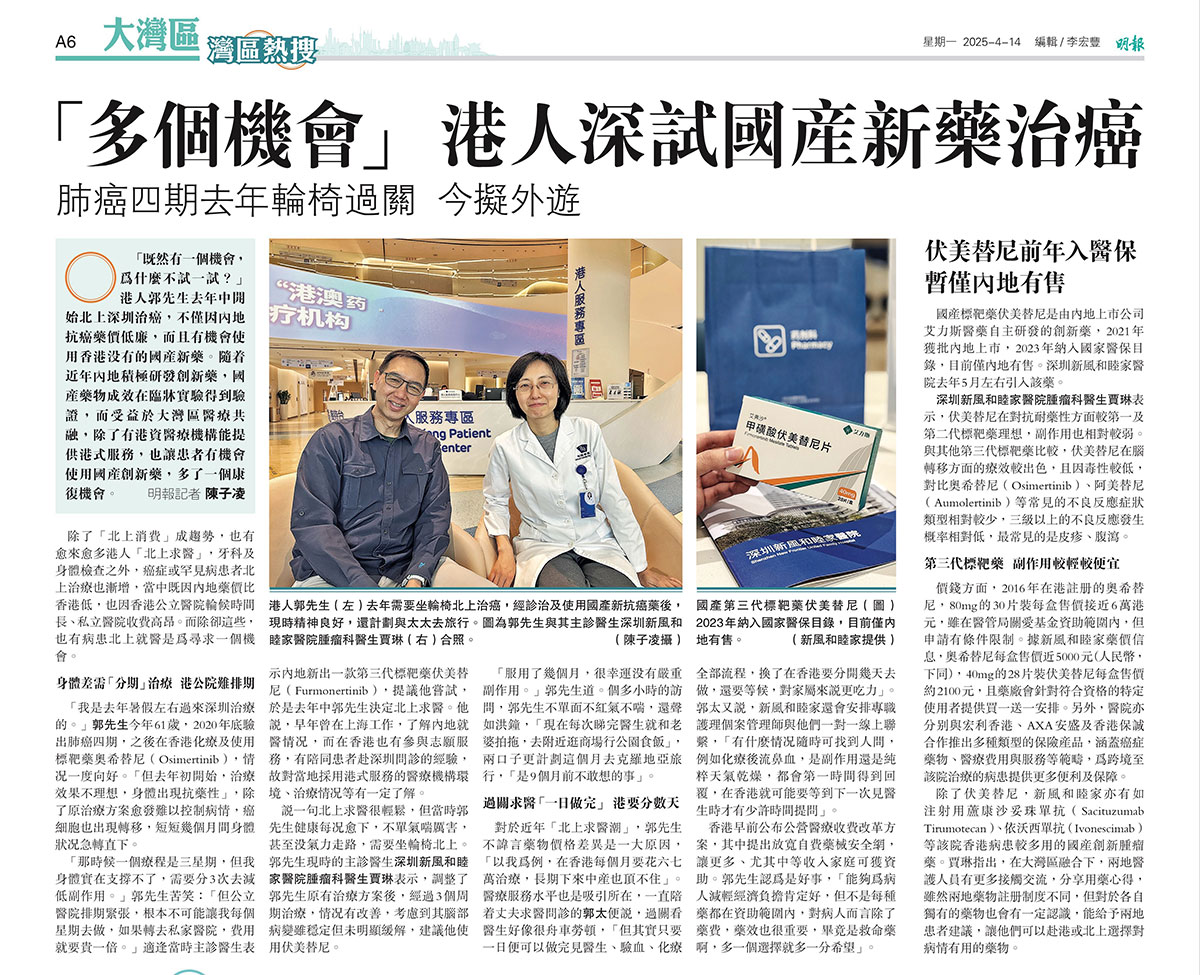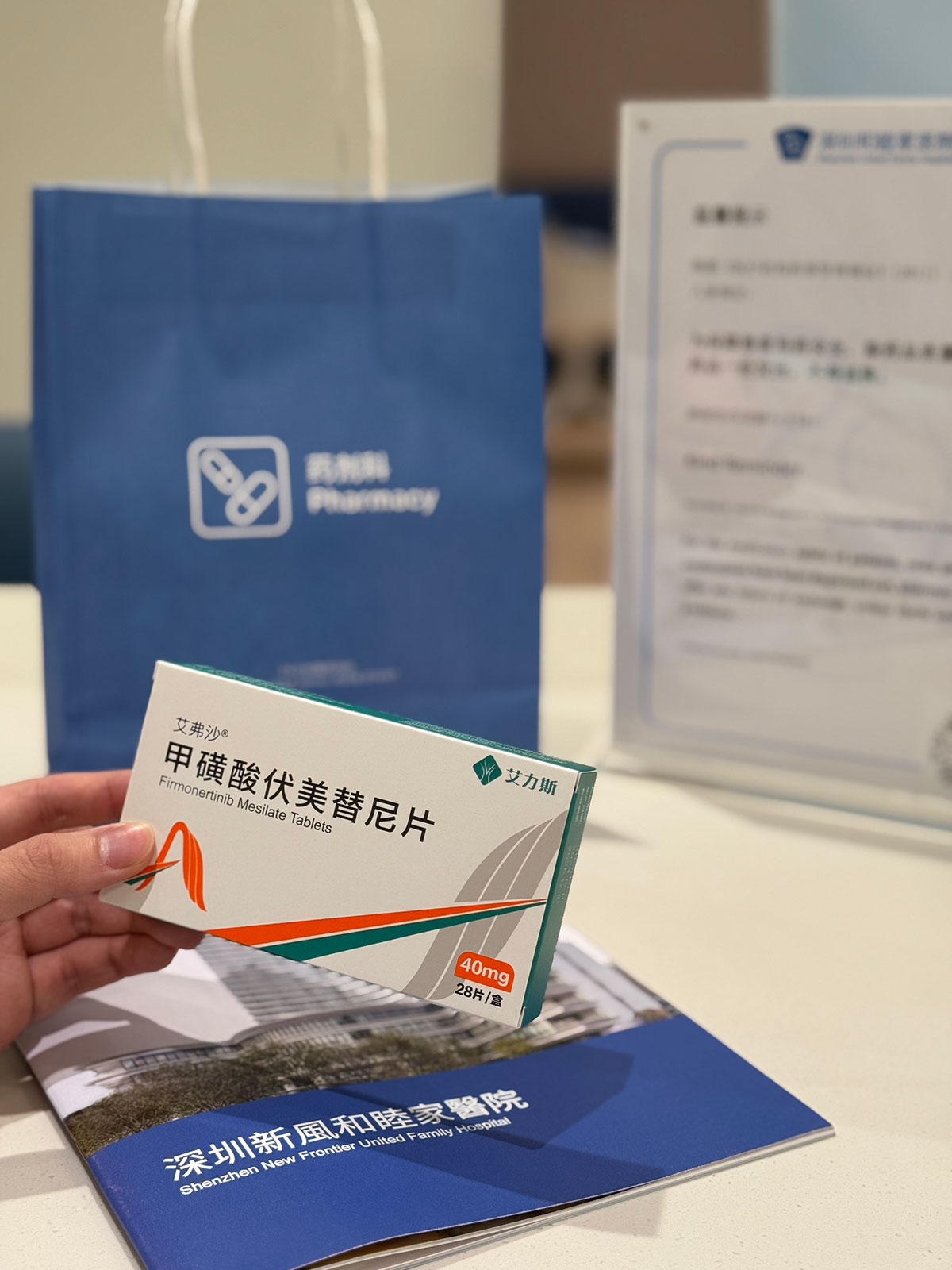
Keyword search
Bay Area hot search: 'Multiple opportunities' Hong Kong people deeply test domestic new drugs to treat cancer, lung cancer, stage IV, last year wheelchair clearance, now planning to travel abroad
Since there is an opportunity, why not give it a try? "Mr. Guo, a Hong Kong resident, started to go north to Shenzhen for cancer treatment in the middle of last year, not only because the prices of anti-cancer drugs in mainland China are low, but also because he has the opportunity to use domestically produced new drugs that are not available in Hong Kong. With the active research and development of innovative drugs in mainland China in recent years, the effectiveness of domestic drugs has been verified in clinical trials. Benefiting from the medical integration in the Greater Bay Area, not only can Hong Kong funded medical institutions provide Hong Kong style services, but patients also have the opportunity to use domestic innovative drugs, which provides an additional rehabilitation opportunity.

In addition to the trend of "going north for consumption", there are also more and more Hong Kong people seeking medical treatment in the north. In addition to dental and physical examinations, cancer patients or rare disease patients seeking treatment in the north are also increasing. This is due to lower drug prices in mainland China compared to Hong Kong, as well as longer waiting times for public hospitals and higher fees for private hospitals in Hong Kong. Besides these, there are also patients who go north for medical treatment in search of an opportunity.
Poor physical condition requires' staged 'treatment, difficult to schedule in Hong Kong public hospitals
I came to Shenzhen for treatment around last summer vacation. Mr. Guo, 61 years old, was diagnosed with stage IV lung cancer at the end of 2020. After receiving chemotherapy and the targeted drug Osimertinib in Hong Kong, his condition improved for a while. But since the beginning of last year, the treatment effect has not been ideal, and the body has developed drug resistance. In addition to the original treatment plan becoming increasingly difficult to control the condition, cancer cells have also metastasized, and the physical condition has rapidly deteriorated in just a few months.
At that time, a course of treatment lasted for three weeks, but my body couldn't support it and I needed to divide it into three sessions to reduce side effects, "Mr. Guo said with a bitter smile." But public hospitals have tight schedules, so it's impossible for me to do it every week. If I were to transfer to a private hospital, the cost would be twice as expensive. "At that time, the attending doctor suggested that he try the third-generation target drug Furmonertinib in mainland China, so Mr. Guo decided to seek medical treatment in the north last year. He said that he had worked in Shanghai in his early years to understand the medical situation in mainland China, and also participated in volunteer services in Hong Kong. He had experience accompanying patients to Shenzhen for consultations, so he had a certain understanding of the local medical institution environment and treatment situation that adopted Hong Kong style services.
It was easy to seek medical treatment in the north, but at that time, Mr. Guo's health was deteriorating. He not only had severe asthma, but also lacked the strength to walk and needed to use a wheelchair to go north. Mr. Guo's current attending physician, Dr. Jia Lin from the Oncology Department of Shenzhen New Frontier United Family Hospital, stated that after adjusting Mr. Guo's original treatment plan and undergoing three cycles of treatment, his condition has improved. Considering that his brain lesions are stable but have not significantly improved, it is recommended that he use Fumatinib.
I took it for several months and luckily there were no serious side effects, "Mr. Guo said. After more than an hour of visit, Mr. Guo not only remained calm and breathless, but also spoke loudly, "Now every time I see a doctor, I date my wife and go shopping and eating in the nearby park." The couple also plans to travel to Croatia this month, "something they couldn't have imagined nine months ago.

Seeking medical treatment through customs in one day takes several days in Hong Kong
For the recent trend of seeking medical treatment in the north, Mr. Guo openly admits that the price difference of drugs is a major reason. "Taking me as an example, in Hong Kong, I have to spend 60-70000 yuan per month on treatment, and even the middle class cannot afford it in the long run. The level of medical services is also attractive. Guo Tai, who has been accompanying her husband to seek medical treatment, said that it seems very exhausting to go through customs and see a doctor, "but in fact, it only takes one day to complete the entire process of seeing a doctor, blood testing, and chemotherapy. If it were in Hong Kong, it would have to be done separately for several days and wait, which would be even more difficult for the family. Guo Tai also said that New Feng United Family Hospital will arrange dedicated nursing case managers to contact them one-on-one online. "If there are any situations, you can always find someone to ask, such as whether nosebleeds after chemotherapy are a side effect or purely due to dry weather. You will receive a response as soon as possible. In Hong Kong, you may have to wait until the next time you see a doctor to ask questions.
Hong Kong previously announced a reform plan for public healthcare fees, which proposed relaxing the safety net for self funded drugs and equipment, allowing more, especially middle-income families, to receive subsidies. Mr. Guo believes that it is a good thing. "It is definitely good to reduce the economic burden on patients, but not every medicine is within the scope of funding. For patients, in addition to the cost of medication, the efficacy is also important. After all, it is a life-saving medicine, and having one more choice means one more hope.
【 Ming Pao Media Link 】:










